Dian Yu
Save the Good Prefix: Precise Error Penalization via Process-Supervised RL to Enhance LLM Reasoning
Jan 26, 2026Abstract:Reinforcement learning (RL) has emerged as a powerful framework for improving the reasoning capabilities of large language models (LLMs). However, most existing RL approaches rely on sparse outcome rewards, which fail to credit correct intermediate steps in partially successful solutions. Process reward models (PRMs) offer fine-grained step-level supervision, but their scores are often noisy and difficult to evaluate. As a result, recent PRM benchmarks focus on a more objective capability: detecting the first incorrect step in a reasoning path. However, this evaluation target is misaligned with how PRMs are typically used in RL, where their step-wise scores are treated as raw rewards to maximize. To bridge this gap, we propose Verifiable Prefix Policy Optimization (VPPO), which uses PRMs only to localize the first error during RL. Given an incorrect rollout, VPPO partitions the trajectory into a verified correct prefix and an erroneous suffix based on the first error, rewarding the former while applying targeted penalties only after the detected mistake. This design yields stable, interpretable learning signals and improves credit assignment. Across multiple reasoning benchmarks, VPPO consistently outperforms sparse-reward RL and prior PRM-guided baselines on both Pass@1 and Pass@K.
Stable and Efficient Single-Rollout RL for Multimodal Reasoning
Dec 20, 2025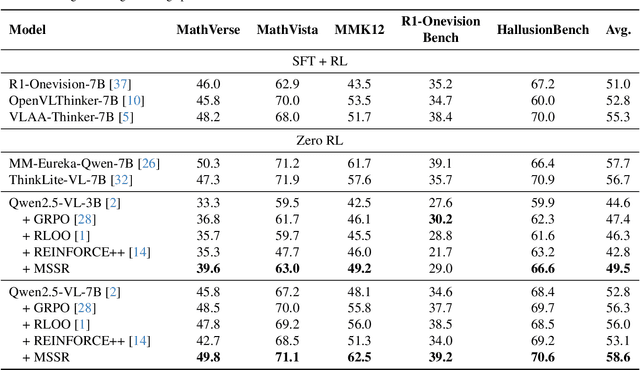


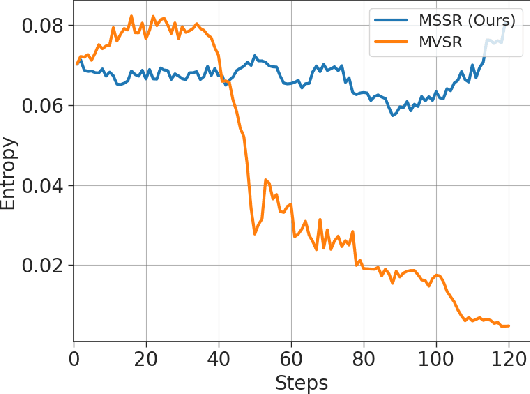
Abstract:Reinforcement Learning with Verifiable Rewards (RLVR) has become a key paradigm to improve the reasoning capabilities of Multimodal Large Language Models (MLLMs). However, prevalent group-based algorithms such as GRPO require multi-rollout sampling for each prompt. While more efficient single-rollout variants have recently been explored in text-only settings, we find that they suffer from severe instability in multimodal contexts, often leading to training collapse. To address this training efficiency-stability trade-off, we introduce $\textbf{MSSR}$ (Multimodal Stabilized Single-Rollout), a group-free RLVR framework that achieves both stable optimization and effective multimodal reasoning performance. MSSR achieves this via an entropy-based advantage-shaping mechanism that adaptively regularizes advantage magnitudes, preventing collapse and maintaining training stability. While such mechanisms have been used in group-based RLVR, we show that in the multimodal single-rollout setting they are not merely beneficial but essential for stability. In in-distribution evaluations, MSSR demonstrates superior training compute efficiency, achieving similar validation accuracy to the group-based baseline with half the training steps. When trained for the same number of steps, MSSR's performance surpasses the group-based baseline and shows consistent generalization improvements across five diverse reasoning-intensive benchmarks. Together, these results demonstrate that MSSR enables stable, compute-efficient, and effective RLVR for complex multimodal reasoning tasks.
CLUE: Non-parametric Verification from Experience via Hidden-State Clustering
Oct 02, 2025
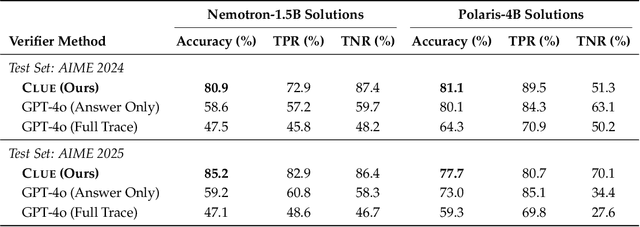
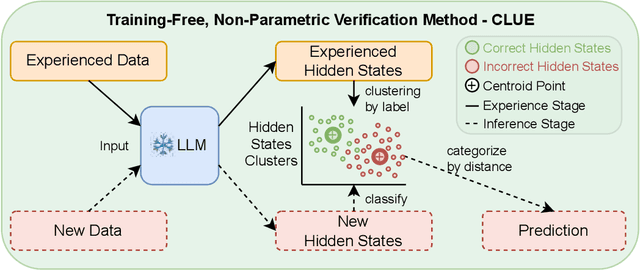
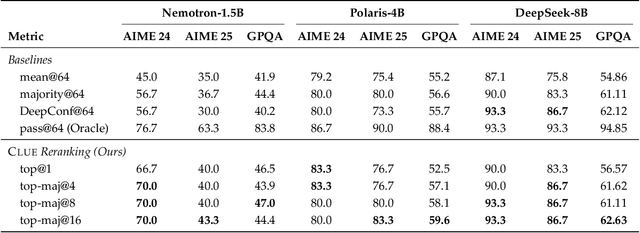
Abstract:Assessing the quality of Large Language Model (LLM) outputs presents a critical challenge. Previous methods either rely on text-level information (e.g., reward models, majority voting), which can overfit to superficial cues, or on calibrated confidence from token probabilities, which would fail on less-calibrated models. Yet both of these signals are, in fact, partial projections of a richer source of information: the model's internal hidden states. Early layers, closer to token embeddings, preserve semantic and lexical features that underpin text-based judgments, while later layers increasingly align with output logits, embedding confidence-related information. This paper explores hidden states directly as a unified foundation for verification. We show that the correctness of a solution is encoded as a geometrically separable signature within the trajectory of hidden activations. To validate this, we present Clue (Clustering and Experience-based Verification), a deliberately minimalist, non-parametric verifier. With no trainable parameters, CLUE only summarizes each reasoning trace by an hidden state delta and classifies correctness via nearest-centroid distance to ``success'' and ``failure'' clusters formed from past experience. The simplicity of this method highlights the strength of the underlying signal. Empirically, CLUE consistently outperforms LLM-as-a-judge baselines and matches or exceeds modern confidence-based methods in reranking candidates, improving both top-1 and majority-vote accuracy across AIME 24/25 and GPQA. As a highlight, on AIME 24 with a 1.5B model, CLUE boosts accuracy from 56.7% (majority@64) to 70.0% (top-maj@16).
VOGUE: Guiding Exploration with Visual Uncertainty Improves Multimodal Reasoning
Oct 01, 2025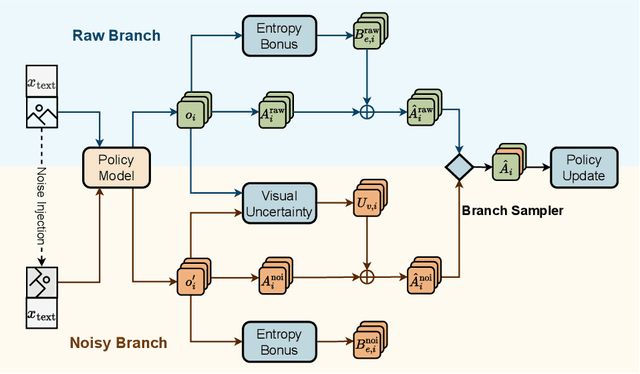
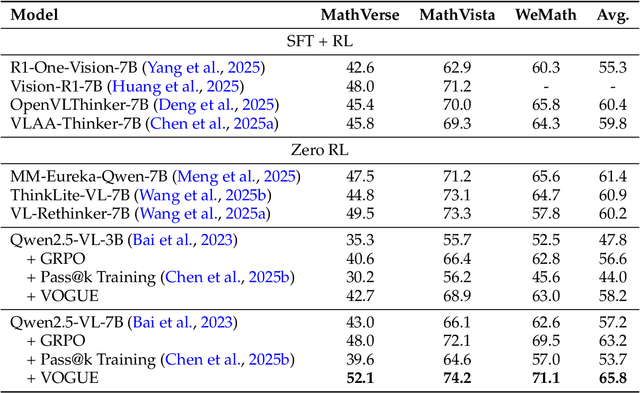
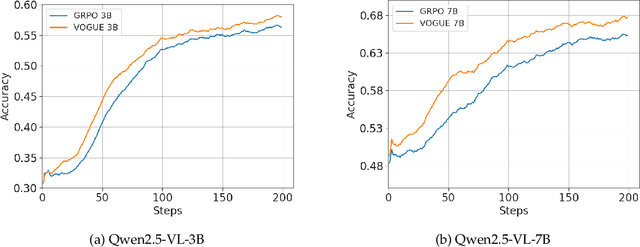
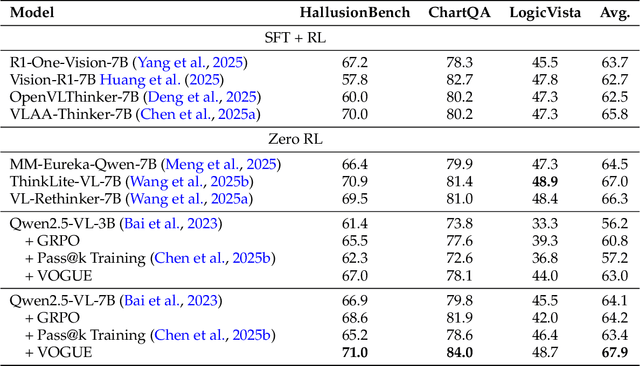
Abstract:Reinforcement learning with verifiable rewards (RLVR) improves reasoning in large language models (LLMs) but struggles with exploration, an issue that still persists for multimodal LLMs (MLLMs). Current methods treat the visual input as a fixed, deterministic condition, overlooking a critical source of ambiguity and struggling to build policies robust to plausible visual variations. We introduce $\textbf{VOGUE (Visual Uncertainty Guided Exploration)}$, a novel method that shifts exploration from the output (text) to the input (visual) space. By treating the image as a stochastic context, VOGUE quantifies the policy's sensitivity to visual perturbations using the symmetric KL divergence between a "raw" and "noisy" branch, creating a direct signal for uncertainty-aware exploration. This signal shapes the learning objective via an uncertainty-proportional bonus, which, combined with a token-entropy bonus and an annealed sampling schedule, effectively balances exploration and exploitation. Implemented within GRPO on two model scales (Qwen2.5-VL-3B/7B), VOGUE boosts pass@1 accuracy by an average of 2.6% on three visual math benchmarks and 3.7% on three general-domain reasoning benchmarks, while simultaneously increasing pass@4 performance and mitigating the exploration decay commonly observed in RL fine-tuning. Our work shows that grounding exploration in the inherent uncertainty of visual inputs is an effective strategy for improving multimodal reasoning.
Evolving Language Models without Labels: Majority Drives Selection, Novelty Promotes Variation
Sep 18, 2025Abstract:Large language models (LLMs) are increasingly trained with reinforcement learning from verifiable rewards (RLVR), yet real-world deployment demands models that can self-improve without labels or external judges. Existing label-free methods, confidence minimization, self-consistency, or majority-vote objectives, stabilize learning but steadily shrink exploration, causing an entropy collapse: generations become shorter, less diverse, and brittle. Unlike prior approaches such as Test-Time Reinforcement Learning (TTRL), which primarily adapt models to the immediate unlabeled dataset at hand, our goal is broader: to enable general improvements without sacrificing the model's inherent exploration capacity and generalization ability, i.e., evolving. We formalize this issue and propose EVolution-Oriented and Label-free Reinforcement Learning (EVOL-RL), a simple rule that couples stability with variation under a label-free setting. EVOL-RL keeps the majority-voted answer as a stable anchor (selection) while adding a novelty-aware reward that favors responses whose reasoning differs from what has already been produced (variation), measured in semantic space. Implemented with GRPO, EVOL-RL also uses asymmetric clipping to preserve strong signals and an entropy regularizer to sustain search. This majority-for-selection + novelty-for-variation design prevents collapse, maintains longer and more informative chains of thought, and improves both pass@1 and pass@n. EVOL-RL consistently outperforms the majority-only TTRL baseline; e.g., training on label-free AIME24 lifts Qwen3-4B-Base AIME25 pass@1 from TTRL's 4.6% to 16.4%, and pass@16 from 18.5% to 37.9%. EVOL-RL not only prevents diversity collapse but also unlocks stronger generalization across domains (e.g., GPQA). Furthermore, we demonstrate that EVOL-RL also boosts performance in the RLVR setting, highlighting its broad applicability.
CDE: Curiosity-Driven Exploration for Efficient Reinforcement Learning in Large Language Models
Sep 11, 2025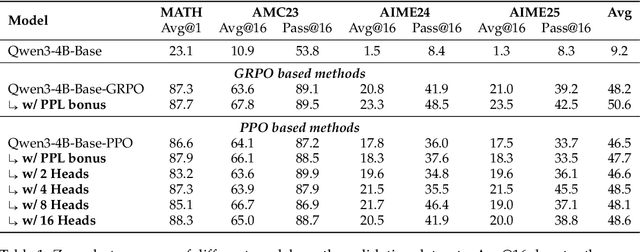

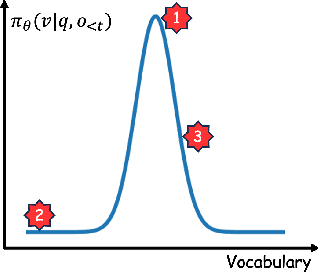

Abstract:Reinforcement Learning with Verifiable Rewards (RLVR) is a powerful paradigm for enhancing the reasoning ability of Large Language Models (LLMs). Yet current RLVR methods often explore poorly, leading to premature convergence and entropy collapse. To address this challenge, we introduce Curiosity-Driven Exploration (CDE), a framework that leverages the model's own intrinsic sense of curiosity to guide exploration. We formalize curiosity with signals from both the actor and the critic: for the actor, we use perplexity over its generated response, and for the critic, we use the variance of value estimates from a multi-head architecture. Both signals serve as an exploration bonus within the RLVR framework to guide the model. Our theoretical analysis shows that the actor-wise bonus inherently penalizes overconfident errors and promotes diversity among correct responses; moreover, we connect the critic-wise bonus to the well-established count-based exploration bonus in RL. Empirically, our method achieves an approximate +3 point improvement over standard RLVR using GRPO/PPO on AIME benchmarks. Further analysis identifies a calibration collapse mechanism within RLVR, shedding light on common LLM failure modes.
Self-Rewarding Vision-Language Model via Reasoning Decomposition
Aug 27, 2025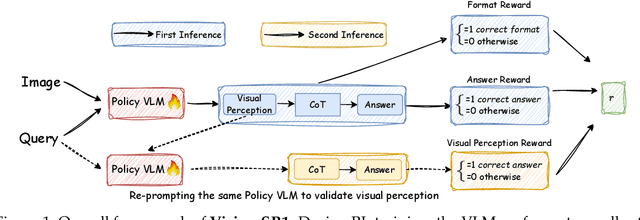
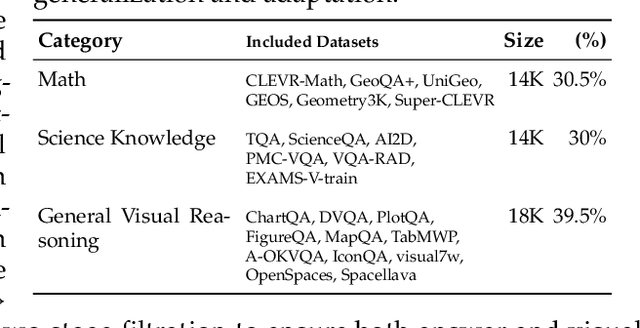

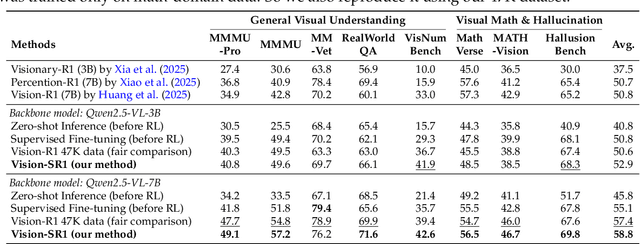
Abstract:Vision-Language Models (VLMs) often suffer from visual hallucinations, saying things that are not actually in the image, and language shortcuts, where they skip the visual part and just rely on text priors. These issues arise because most post-training methods for VLMs rely on simple verifiable answer matching and supervise only final outputs, leaving intermediate visual reasoning without explicit guidance. As a result, VLMs receive sparse visual signals and often learn to prioritize language-based reasoning over visual perception. To mitigate this, some existing methods add visual supervision using human annotations or distilled labels from external large models. However, human annotations are labor-intensive and costly, and because external signals cannot adapt to the evolving policy, they cause distributional shifts that can lead to reward hacking. In this paper, we introduce Vision-SR1, a self-rewarding method that improves visual reasoning without relying on external visual supervisions via reinforcement learning. Vision-SR1 decomposes VLM reasoning into two stages: visual perception and language reasoning. The model is first prompted to produce self-contained visual perceptions that are sufficient to answer the question without referring back the input image. To validate this self-containment, the same VLM model is then re-prompted to perform language reasoning using only the generated perception as input to compute reward. This self-reward is combined with supervision on final outputs, providing a balanced training signal that strengthens both visual perception and language reasoning. Our experiments demonstrate that Vision-SR1 improves visual reasoning, mitigates visual hallucinations, and reduces reliance on language shortcuts across diverse vision-language tasks.
DeepMath-103K: A Large-Scale, Challenging, Decontaminated, and Verifiable Mathematical Dataset for Advancing Reasoning
Apr 15, 2025



Abstract:The capacity for complex mathematical reasoning is a key benchmark for artificial intelligence. While reinforcement learning (RL) applied to LLMs shows promise, progress is significantly hindered by the lack of large-scale training data that is sufficiently challenging, possesses verifiable answer formats suitable for RL, and is free from contamination with evaluation benchmarks. To address these limitations, we introduce DeepMath-103K, a new, large-scale dataset comprising approximately 103K mathematical problems, specifically designed to train advanced reasoning models via RL. DeepMath-103K is curated through a rigorous pipeline involving source analysis, stringent decontamination against numerous benchmarks, and filtering for high difficulty (primarily Levels 5-9), significantly exceeding existing open resources in challenge. Each problem includes a verifiable final answer, enabling rule-based RL, and three distinct R1-generated solutions suitable for diverse training paradigms like supervised fine-tuning or distillation. Spanning a wide range of mathematical topics, DeepMath-103K promotes the development of generalizable reasoning. We demonstrate that models trained on DeepMath-103K achieve significant improvements on challenging mathematical benchmarks, validating its effectiveness. We release DeepMath-103K publicly to facilitate community progress in building more capable AI reasoning systems: https://github.com/zwhe99/DeepMath.
Safe Flow Matching: Robot Motion Planning with Control Barrier Functions
Apr 11, 2025Abstract:Recent advances in generative modeling have led to promising results in robot motion planning, particularly through diffusion and flow-based models that capture complex, multimodal trajectory distributions. However, these methods are typically trained offline and remain limited when faced with unseen environments or dynamic constraints, often lacking explicit mechanisms to ensure safety during deployment. In this work, we propose, Safe Flow Matching (SafeFM), a motion planning approach for trajectory generation that integrates flow matching with safety guarantees. By incorporating the proposed flow matching barrier functions, SafeFM ensures that generated trajectories remain within safe regions throughout the planning horizon, even in the presence of previously unseen obstacles or state-action constraints. Unlike diffusion-based approaches, our method allows for direct, efficient sampling of constraint-satisfying trajectories, making it well-suited for real-time motion planning. We evaluate SafeFM on a diverse set of tasks, including planar robot navigation and 7-DoF manipulation, demonstrating superior safety, generalization, and planning performance compared to state-of-the-art generative planners. Comprehensive resources are available on the project website: https://safeflowmatching.github.io/SafeFM/
Crossing the Reward Bridge: Expanding RL with Verifiable Rewards Across Diverse Domains
Apr 01, 2025



Abstract:Reinforcement learning with verifiable rewards (RLVR) has demonstrated significant success in enhancing mathematical reasoning and coding performance of large language models (LLMs), especially when structured reference answers are accessible for verification. However, its extension to broader, less structured domains remains unexplored. In this work, we investigate the effectiveness and scalability of RLVR across diverse real-world domains including medicine, chemistry, psychology, economics, and education, where structured reference answers are typically unavailable. We reveal that binary verification judgments on broad-domain tasks exhibit high consistency across various LLMs provided expert-written reference answers exist. Motivated by this finding, we utilize a generative scoring technique that yields soft, model-based reward signals to overcome limitations posed by binary verifications, especially in free-form, unstructured answer scenarios. We further demonstrate the feasibility of training cross-domain generative reward models using relatively small (7B) LLMs without the need for extensive domain-specific annotation. Through comprehensive experiments, our RLVR framework establishes clear performance gains, significantly outperforming state-of-the-art open-source aligned models such as Qwen2.5-72B and DeepSeek-R1-Distill-Qwen-32B across domains in free-form settings. Our approach notably enhances the robustness, flexibility, and scalability of RLVR, representing a substantial step towards practical reinforcement learning applications in complex, noisy-label scenarios.
 Add to Chrome
Add to Chrome Add to Firefox
Add to Firefox Add to Edge
Add to Edge